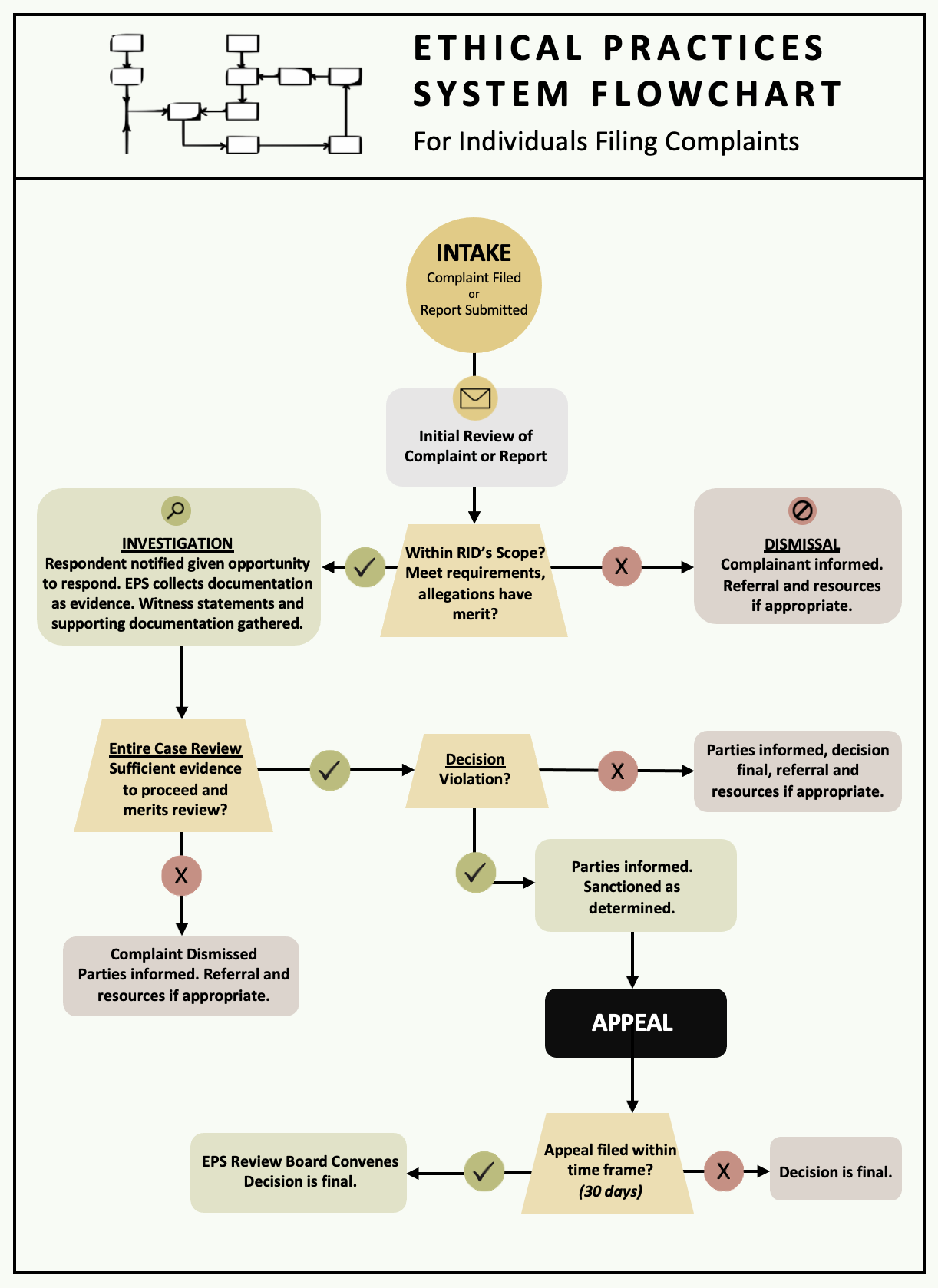Enforcement procedures for the associated EPS policy.
Complaint: A complaint is a formal declaration to EPS that a consumer, interpreting professional or interpreting entity (a “respondent”) has allegedly experienced intentional or unintentional harm that is a violation of EPS policy.
- Complaints stating an alleged violation of this Policy may originate from any consumer, interpreting professional, or entity within or outside RID.
- Report: A report is the submission of documentation of an alleged violation of EPS policy for which there is no named complainant. EPS may initiate a report (“self-initiated report”) based on information from any internal or external source indicating that a person subject to this Policy’s jurisdiction may have committed acts that violate this Policy (e.g., public information concerning an RID member such as court judgments or media releases that indicate a potential violation of this Policy).
All complaints and reports must be submitted to EPS using their designated forms. Complainants must complete the form(s) in its entirety.
- Complaints: EPS staff may schedule an intake meeting with the complainant. .The intake may be completed in the language preferred by the complainant, including but not limited to ASL, ProTactile, written or spoken English. The Intake Coordinator will collect all documentation relevant to the alleged violation.
- Reports: EPS Staff will gather available documentation on the alleged violation.
- EPS has a role in educating and guiding its members toward appropriate professional conduct in all aspects of their diverse professional and volunteer roles.
- If the EPS determines that the respondent has engaged in professional conduct that constitutes a violation of the Policy, it may take private and/or public actions.
- All decisions by the EPS will be documented in perpetuity internally by RID headquarters.
- All parties involved are immediately informed of the decision of the resulting actions/sanction(s) and plan for carrying out the sanction(s) as decided by the EPS.
- Possible Resulting Actions/ Sanctions:
- Non-public Reprimand and Warning
- The EPS will send a letter to the respondent outlining the violation with a warning that the complaint will be documented in perpetuity internally by RID headquarters. The complaint may be utilized in any future complaint as evidence of a pattern of harm and professional disregard.
- Public Reprimand and Warning
- Publication of the respondent’s name, violations, date of the decision, and sanctions in RID VIEWS and RID Website and,
- Notification sent to the respondent’s
- Respective state or local licensing entities
- Supervision
- Supervision is defined as a colleague who is monitoring the process and completion of the consequences as prescribed by the EPS.
- This assigned supervisor will provide support or coaching, as outlined by the EPS Review Board, and provide progress reports along with any further identified action steps needed, based on the observations seen over the course of the supervisory relationship.
- The respondent will be responsible to meet with the supervisor at regular intervals to demonstrate progress and may be responsible to pay the supervisor’s time at fair market value.
- (Re)Education
- Assigned number of hours of (re)education. The exact nature and type of education will be assigned by the EPS.. All education plans must be approved and monitored by the EPS. This may include:
- Courses/Seminars/Workshops. A specific number of hours focused on the development of ethics, accountability, language enhancement, soft skills, team interpreting, business practices, etc.
- Reflective and critical analysis in writing/video. This analysis will:
- Demonstrate an understanding of the impact of the violation(s)
- Demonstrate an understanding of the ‘harm’ and the impact of the harm on consumers, team interpreters, colleagues, and/or stakeholders
- Demonstrate an understanding of the risks and possible outcomes that the action(s) caused
- Describe a plan of how to avoid repeating the violation in the future.
- The respondent may not earn CEUs for any portion of the (re)education.
- Assigned number of hours of (re)education. The exact nature and type of education will be assigned by the EPS.. All education plans must be approved and monitored by the EPS. This may include:
- Revocation of CEUs
- This is applicable, should the respondent be found in violation of the Certification Maintenance Program (CMP) protocols and procedures. The exact amount of the CEUs revoked will be at the discretion of the EPS. The revocation could include all of the respondent’s current-cycle accumulated CEUs.
- Prohibition from Presenting at RID CEU-bearing Events
- Ineligible to present, lead, facilitate, and/or co-facilitate a RID CEU-bearing event or activity.
- The duration of this prohibition will be at the discretion of the EPS.
- Public Letter of Apology
- The respondent will be required to submit a bilingual (ASL/English) public letter of apology for the found violations. This letter will be published in the RID VIEWS and RID website.
- The letter will be archived on the same page as the publication of EPS violations on the RID website.
- Suspension of Certification
- The duration of the suspension will be at the discretion of the EPS.
- Notification of suspension will also be sent to:
- Respective state or local licensing entities
- Revocation of Certification
- The duration of the revocation will be at the discretion of the EPS.
- Notification of revocation will also be sent to:
- Respective state or local licensing entities
- Revocation of Membership
- The duration of the revocation will be at the discretion of the EPS Review Board.
- This may include barring eligibility for membership indefinitely.
- Notification of revocation will also be sent to:
- Respective state or local licensing entities
- Ineligiblity for CASLI examinations
- The duration of inegligiblity will be at the discretion of the EPS.
- Non-public Reprimand and Warning
- Response—Within thirty (30) calendar days of notification of the EPS’s decision and any sanction, the respondent shall choose one of the following responses:
- Accept the Decision: Accept the decision of the EPS (as to both the Policy violation and the sanction) and waive any right to appeal.
- Appeal: Inform the EPS in video or written form that they want to contest the EPS’s decision and sanction and request to initiate the appeal process.
- Decide Not to Respond: Failure of the respondent to take one of the above actions within the time specified will be deemed to constitute acceptance of the decision and sanction.
- Action Following Respondent’s Answer
- Acceptance: If the respondent accepts the decision and sanction, the EPS will notify all relevant parties and impose the sanction and the case will be monitored until the sanctions are complete and the respondent submits satisfactory proof of completion of the imposed corrective action. After which the case will be considered closed and an internal file created.
- Should the case not receive satisfactory evidence of completion EPS staff will determine the appropriate next steps. In cases of extreme disregard, this can include the revocation of membership.
- In extenuating circumstances where the respondent is unable to comply with the sanction(s) as outlined, the following actions must be taken by the respondent; (1) notify EPS staff immediately of the circumstance, (2) determine a reasonable course of action with EPS staff in consultation with the EPS Review Board as deemed necessary, (3) adhere to the revised course of action.
- Request an Appeal: If the respondent requests an appeal, the EPS staff will schedule it. Step 5 describes the Appeal process.
- Acceptance: If the respondent accepts the decision and sanction, the EPS will notify all relevant parties and impose the sanction and the case will be monitored until the sanctions are complete and the respondent submits satisfactory proof of completion of the imposed corrective action. After which the case will be considered closed and an internal file created.
- The decision may be appealed within 30 days of being notified of the EPS decision by written letter or video letter. The grounds for the appeal shall be explained by the respondent via a written document or video that includes a detailed statement as to the reasons for the appeal, the decision, and a list of potential witnesses (if any) and/or materials and the subject matter they will address.
- The purpose of the Appeal is to provide the respondent an opportunity to provide further evidence to refute the decision and/or sanction decided on by the EPS and to permit the EPS Review Board to present the evidence in support of the EPS Review Board decision. The EPS Review Board is convened upon written or video request by the respondent. The EPS Review Board shall consider the matters alleged in the complaint; the matters raised in defense; the EPS decision; and other relevant facts, ethical principles, and federal or state law, if applicable. The EPS Review Board may question the parties concerned and determine professional misconduct issues arising from the factual matters in the case, even if those specific issues were not raised by the complainant. The EPS Review Board may also choose to apply principles or other language from the Policy not originally identified by the EPS. The EPS Review Board may affirm the decision, reverse or modify it, or remand it to the EPS for review if its written procedures were not followed.
- Appeals shall generally address only the issues, procedures, or sanctions that are part of the EPS findings. However, in the interest of fairness, the EPS Review Board may consider newly available evidence that is directly related to the original complaint.
- The parties in the appeals process are the respondent and the EPS Review Board.
- The EPS Review Board and staff shall initiate the appeal process as follows:
- Notification of Parties – The EPS staff will inform the EPS Review Board immediately upon receipt of a formal written or video request for an appeal.
- The EPS Review Board members shall be convened within fifteen (15) calendar days of receipt of a formal written or video appeal request.
- Decision
- The EPS Review Board shall conduct a review of the prior decision.
- The decision of the EPS Review Board shall be by majority vote.
- The EPS Review Board shall have the power to (a) affirm the decision, (b) modify the decision, or (c) reverse the original decision.
- Within fourteen (14) calendar days, the EPS Review Board shall share the appeal decision with EPS staff, who in turn will notify the respondent, the original complainant, and any other parties deemed appropriate of the decision. For RID purposes, the decision of the EPS Review Board shall be final.
- The official record of the EPS Review Board and its decision shall be maintained by RID in perpetuity.
- All notifications referred to in these Enforcement Procedures shall be in writing.
- The investigative case files shall include the complaint and any documentation the EPS relied on upon initiating the investigation. At the completion of the enforcement process, the written records and reports that state the initial basis for the complaint or report, material evidence, and the disposition of the complaint shall be retained by the EPS indefinitely.
- Final decisions will be publicized only after any appeal process has concluded. Public sanctions will be published in official publications of the RID and EPS under the following time frames:
- Sanctions of Public Reprimand will remain published indefinitely.
- Sanctions of Suspension will remain published indefinitely.
- Sanctions of Revocation will remain published indefinitely.
- Modification – The EPS reserves the right to (a) modify the time periods, procedures, or application of these Enforcement Procedures for good cause consistent with fundamental fairness in each case and (b) modify its Policy and/or these Enforcement Procedures, with such modifications to be applied only prospectively.
What is the difference between filing an EPS complaint versus filing an EPS report?
A complaint is related to violations of the EPS Policy and/or the CPC. Complainants are named.
A report is sharing information that is public (i,e. court judgments, newspaper articles.) This is to inform RID of this information, the EPS may or may not initiate action. Complainants are anonymous.
The Six EPS Procedures in ASL HERE
Where are you in the current EPS process?
FOR THE COMPLAINANT
You will receive confirmation within 5 business days.
The EPS will notify you if more information is needed. If the EPS has all information and determines your complaint has merit, is within RID’s scope and meets all requirements, the EPS will request a response from the interpreter and begin investigating your complaint. The EPS will inform you of this or inform you that the complaint is being dismissed.
The EPS will begin investigating your complaint, which includes requesting a response from the interpreter and gathering evidence. The interpreter has 30 days to respond. The EPS will notify you once a decision has been made.
FOR THE RESPONDENT
Respondents must provide a response within 30 days of notification.
The EPS will notify you once a decision has been made.
You will be notified if the case is dismissed or if a violation is found. You have 30 days to file an appeal if you disagree with the decision, otherwise the decision stands.
The initial decision will be reviewed by the EPS Review Board and a final decision will be made.
Flowchart below.


